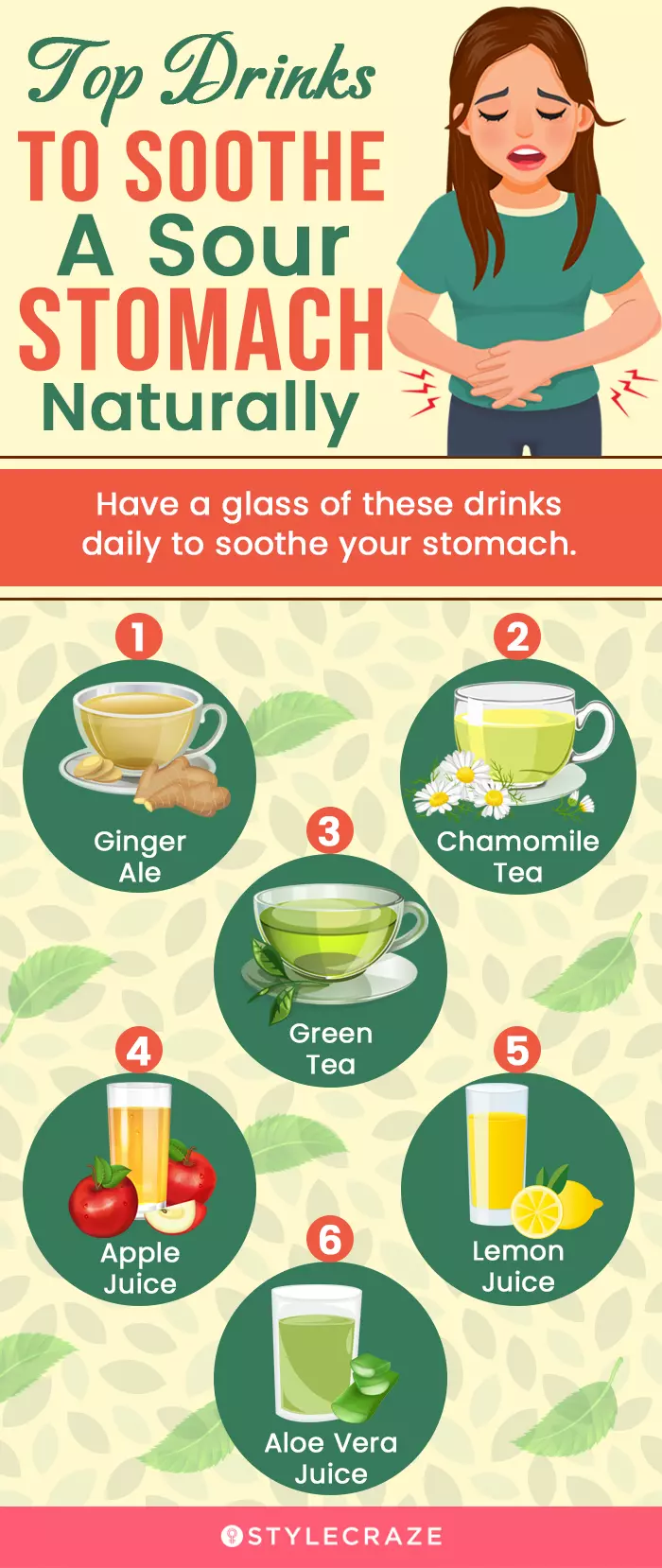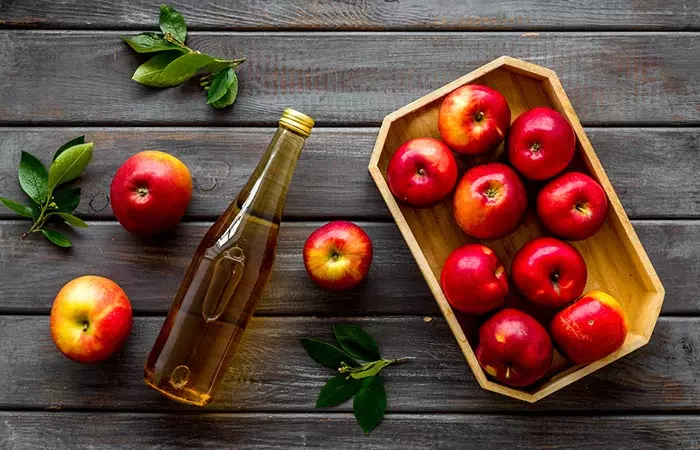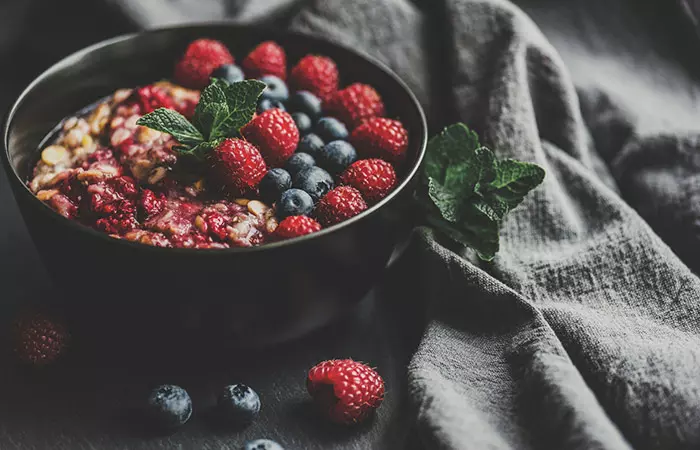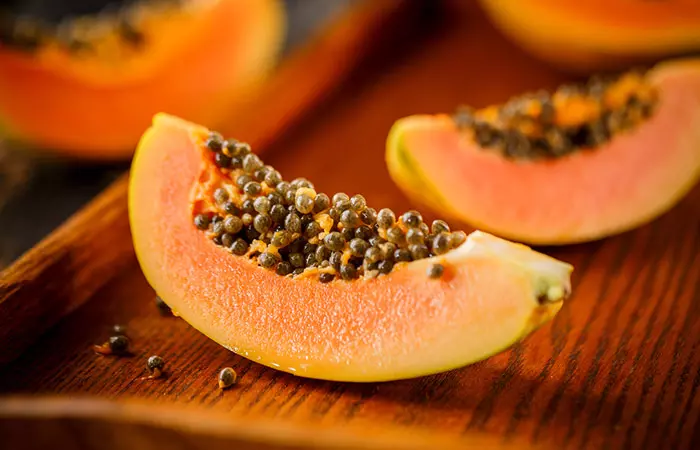12 Home Remedies For Sour Stomach: Causes And Prevention Tips
Acidity and indigestion are common issues that are commonly treatable at home with pantry staples.

Image: Shutterstock
What is a sour stomach? Indigestion, often known as sour stomach, is a frequent illness characterized by various symptoms like burping, constant bloating, and abdominal discomfort. Along with these, a sour stomach may also give rise to a radiating pain that often seems to reach the chest area. Home remedies for sour stomach focus on relieving all these symptoms as well as resolving the primary issue. But what is that?
A sour stomach develops because of an excess of hydrochloric acid accumulating in the digestive tract and stomach, resulting in acute acidity and heartburn (1), (2).
Note: A sour stomach is a temporary symptom that might become chronic or recurrent. It occasionally vanishes and reappears after a few weeks. It can result in chronic diseases like ulcers and injury to the digestive tract if left untreated. As a result, it is critical to address this issue as quickly as possible.
This article has gathered a list of 12 home treatments for sour stomach relief. Continue reading!
 Did You Know?
Did You Know?In This Article
- How To Get Rid Of Sour Stomach – 12 Natural Remedies
- Causes Of Sour Stomach
- Symptoms Of Sour Stomach
How To Get Rid Of Sour Stomach – 12 Natural Remedies
1. Apple Cider Vinegar
Apple cider vinegar can help counteract the extra acid produced in the stomach and restore the stomach’s pH to its normal levels. Its use dates back to the 18th century for relieving stomach aches and discomfort (3).
You Will Need
- 1 tablespoon apple cider vinegar
- 1 tablespoon honey
- A glass of water
What You Have To Do
Mix the ACV and honey in the water and drink this mixture.
How Often You Need To Do This
Repeat after a few hours if required.
2. Baking Soda
Baking soda is a commonly used home remedy for indigestion. Anecdotal evidence suggests that it neutralizes the extra acid in the stomach and relieves nausea and bloating in the stomach. However, scientific studies claim that consuming baking soda in excess can lead to cardiac problems and metabolic issues (4), (5). Hence, you need to consult a healthcare provider before trying this remedy. Do not follow it without medical supervision.
You Will Need
- 1/2-1 teaspoon baking soda
- 1/2 glass of water
What You Have To Do
Mix the baking soda in the water and drink immediately.
How Often You Need To Do This
Repeat after four hours, if required.
3. Bananas
The banana is easy on the stomach. It has been used traditionally to treat stomach and digestion issues (6), (7).
You Will Need
Bananas
What You Have To Do
Eat a banana either before or after your meals.
How Often You Need To Do This
You can eat 2-3 bananas in a day.
4. Ginger Ale
Ginger ale is a carbonated drink that consists of ginger extracts. Ginger can help relieve indigestion and upset stomach due to the phytochemicals present in it (8), (9), (10). It may also help you burp and relieve nausea (11).
You Will Need
Homemade ginger ale or ginger tea
What You Have To Do
Drink a glass of ginger ale or tea whenever you experience a sour stomach or indigestion.
How Often You Need To Do This
Repeat as and when required.
Joy, a blogger, recalled drinking ginger ale during childhood or whenever she had one too many beverages. As per her experience, it was a great natural remedy for her stomach problems. She wrote, “My mom would give us the fizzy ginger ale to help settle an upset stomach (i).”
 Did You Know?
Did You Know?5. Chamomile Tea
The phenolic compounds and terpenoidsi They are large and diverse groups of chemical compounds that help in the growth and development of plants. present in chamomile relax your digestive system. This tea can help relieve stomach cramps, bloating, nausea, and indigestion (12), (13), (14). It also has carminativei The property of any drug or substance to either prevent gas formation in the abdomen or expel the gas to relieve flatulence. properties and can relieve flatulence (15).
You Will Need
- 1-2 teaspoons dried chamomile or a teabag
- A cup of hot water
What You Have To Do
- Steep the chamomile in hot water for about 15 minutes.
- Strain and drink this decoction while it is warm.
How Often You Need To Do This
Drink 2-3 cups of chamomile tea in a day.
6. Cinnamon
Cinnamon exerts gastroprotective effects. It has been used for ages to treat indigestion, abdominal cramps, nausea, and flatulence (16).
You Will Need
- 1 teaspoon cinnamon powder
- A cup of warm water
What You Have To Do
Mix the cinnamon powder in the water and sip on this tea.
How Often You Need To Do This
Repeat after an hour if required.
7. Green Tea
Green tea is rich in antioxidants. Consuming green tea every day can help prevent gastrointestinal disorders (17).
Caution: Avoid milk tea and milk products if you have a sour stomach.
You Will Need
- 1-2 teaspoons green tea leaves or a teabag
- A cup of hot water
What You Have To Do
- Steep the green tea leaves or teabag for 5-10 minutes and strain.
- Drink this tea while it is warm. You can add a bit of honey and/or lemon.
How Often You Need To Do This
Have 2-3 cups of green tea in a day.
8. Oatmeal
Oatmeal can help soothe stomach problems. It is an easy-to-digest food and also rich in fiber. Pair it up with toast, use it as a replacement for white rice, or prepare it with nuts. It possesses potential prebiotic properties, which contribute to gut health (18).
Caution: Do not use milk as it may irritate your stomach further.
You Will Need
- 1 cup oatmeal
- Warm water
- 1-2 teaspoons honey (optional)
- Fruits like berries and bananas (optional)
What You Have To Do
- Prepare a bowl of oatmeal with warm water.
- Add honey and fruits of your choice and eat it as a meal.
How Often You Need To Do This
Eat a bowl or two of oatmeal a day.
9. Juices For Sour Stomach
(a) Apple Juice
Apple contains pectin, a fiber that can help enhance digestion and improve the intestinal environment, leading to better gastrointestinal health (19).
You Will Need
Organic or pressed apple juice
What You Have To Do
Drink a cup of apple juice. You can also dilute it with water in the ratio 1:1 if you feel it is too thick.
How Often You Need To Do This
Do this 2 times a day for a few days.
(b) Lemon Juice
Lemon juice has antacid effects (20). It can help relieve bloating, gas, and heartburn. It improves digestion and enhances bile flow to the stomach. Lemon juice also has antimicrobial and antioxidant properties (21). These properties protect your stomach from infections.
You Will Need
- 2 tablespoons lemon juice
- A cup of warm water
What You Have To Do
Mix the lemon juice in the warm water and sip on it.
How Often You Need To Do This
Drink another cup of lemon water after a few hours if required.
(c) Aloe Vera Juice
A study found that aloe vera juice could help reduce symptoms of GERDi Gastroesophageal reflux disease is a digestive condition in which stomach acid irritates the food pipe lining. , like belching, flatulence, nausea, vomiting, heartburn, and acid and food regurgitation (22).
You Will Need
- Aloe vera leaf
- A glass of water
What You Have To Do
- Cut the aloe vera leaf at its base and let the sap ooze out. Place the leaf on a plate and cut through the middle to remove the aloe vera gel.
- Mix two tablespoons of this in a glass of water and drink it.
- You can store the rest of the gel for a week to 10 days in the refrigerator.
How Often You Need To Do This
Drink 2 glasses of fresh aloe vera juice every day.
10. Olive Oil
Olive oil was found to help relieve constipation in patients (23). These properties may also soothe an upset stomach and help with digestion. Hence, it may also help with a sour stomach.
You Will Need
1 teaspoon extra virgin olive oil
What You Have To Do
Take this half an hour before your meals.
How Often You Need To Do This
Do this before every meal.
11. Papaya
Papaya is a long-term remedy for sour stomach. Consuming papaya can relieve symptoms of abnormal digestion, like flatulence, bloating, and burning sensation (24).
You Will Need
A cup of fresh papaya
What You Have To Do
Eat papaya half an hour before your meals.
How Often You Need To Do This
Eat 2-3 cups a day.
12. Yogurt
Yogurt contains probiotics that control the overgrowth of unhealthy bacteria that are causing excess acid production, flatulence, and bloating (25).
You Will Need
Organic plain yogurt
What You Have To Do
Eat 2-3 cups of plain yogurt during the day. You can have it before meals, during meals, or in between meals as a snack.
How Often You Need To Do This
Include yogurt in your daily diet.
Apart from the above-listed sour stomach remedies, anecdotal evidence recommends adding ingredients like caraway seeds, cumin seeds, licorice water, fenugreek, slippery elm, cloves, cardamom, marshmallow root, and pineapples to enhance the taste of these remedies. Teas like dandelion tea, licorice tea, and fennel tea may also be used to treat sour stomachs. However, most of these ingredients have no scientific evidence or research that can prove their efficacy. Please consult a doctor before trying these remedies.
Wondering what causes a sour stomach? Well, there are various factors that can lead to a sour stomach. The most common ones are listed below.
Causes Of Sour Stomach
- Overeating – Consuming more food than you can digest leads to excess production of hydrochloric acid, leading to acidity and sour stomach.
- Carbonated Beverages – They contain aerated gas and alcohol, which lead to the production of excess acid in the stomach.
- Spicy Foods – Spicy foods often lead to a burning sensation in the alimentary and digestive tracts, indicating the onset of a sour stomach.
- Foods That Weaken The Lower Esophageal Sphincter – Coffee, tea, chocolate, mint, citrus, dairy, etc.
- Medical Conditions – Occasionally, a persistent sour stomach may be caused due to gastritis and pylori.
Sarah Robbins, MD, MSc, FRCPC, says, “The most common bacterial infection associated with reflux and dyspepsia is Helicobacter pylori. Your healthcare provider can assess for the presence of this infection using blood or stool tests, a specialized breath test, or stomach biopsies. This may require a specialized course of antibiotics to treat. There are increasing rates of antibiotic resistance for Helicobacter infections, so discuss this with your physician directly.”
She adds, “Less commonly, small intestinal bacterial overgrowth and gut dysbiosis (altered bacteria) can contribute to a sour stomach. These may be treated occasionally with antibiotics. However, as a general rule, I would advise you to avoid antibiotics and focus on a strategy to achieve a thriving gut microbiome instead.”
Symptoms Of Sour Stomach
Robbins says, “Sour stomach generally refers to gastroesophageal reflux, although for some patients, this may also be a manifestation of functional dyspepsia or other more serious disorders. Acid reflux events generally last for several minutes, and even as long as 2-3 hours.” A person who has a sour stomach has the following symptoms:
- Nausea – The accumulation of acid in the stomach causes a sensation of vomiting. It is also commonly referred to as queasiness or bilus.
- Regurgitation – This is reflux or backward flow of the stomach contents into the esophagus, which can reach up as high as the throat. This leads to a burning sensation and sour taste in the esophagus and alimentary tract.
- Stomach Bloating – This refers to the sensation of feeling bloated or full even after a small meal. It is accompanied by gas in the stomach. This causes extensive cramps and belching. This is the most common symptom of a sour stomach.
According to a survey conducted on 88,795 participants, it was seen that 12,324 (13.9%) reported bloating in a week. Of these, 58.5% never sought treatment for bloating and 29% were self-managing symptoms or were not comfortable discussing their symptoms with a healthcare provider.
Robbins cautions, “Problematic acid reflux generally occurs more than twice per week. You should see a healthcare provider if your episodes are increasing in frequency or in severity. The following symptoms should prompt you to make an appointment with your doctor:
- Vomiting – especially large volumes or forceful vomiting
- Spitting up blood or passing blood in the stool
- Involuntary weight loss
- Chest pain
- A family history of stomach or esophageal cancer
- Painful swallowing, or the sensation that food is getting stuck when you swallow
- If you are using prescription anti-reflux medications and you feel they aren’t working”
She adds, “In these instances, your healthcare provider may refer you to a gastroenterologist or for X-rays, blood work, or even upper endoscopy.”
Infographic: Top Drinks To Soothe A Sour Stomach Naturally
An upset or sour stomach is typically seen after a night of overindulging food, especially greasy ones. Turn the tables in this unpleasant condition with just a glass of nourishing, delicious drinks.
Check out the infographic below to learn the best beneficial beverages you need to have handy to soothe your stomach naturally. Illustration: StyleCraze Design Team
Indigestion or sour stomach may be caused by overeating, spicy food intake, medical conditions like gastritis, and drinking too many carbonated beverages and certain foods in excess like coffee, mint, etc. Bloating, sour-tasting reflux and nausea are the most tell-tale signs of a sour stomach. To get rid of sour stomach, you can use home remedies like apple cider vinegar, herbal teas, baking soda, bananas, papaya, and fruit juices. If you continue to experience a sour stomach even after using some of the remedies discussed here or suffer from it frequently, you should consult your healthcare provider to check for underlying issues.
Frequently Asked Questions
How do I get rid of a sour stomach in 5 minutes?
Over-the-counter antacids, ginger, soda, fennel seeds and peppermint tea can instantly help with a sour stomach. However, it may take longer than 5 minutes to get rid of the discomfort.
Is Tums good for a sour stomach?
Yes, Tums can help neutralize the acidic environment in the stomach and treat indigestion and heartburn in most cases.
What causes sour stomach burps?
Stress, IBS, acid reflux and certain foods that create excess gas in the stomach can cause sour stomach burps.
Key Takeaways
- Consuming a lot of spicy food or drinking carbonated drinks can cause a sour stomach.
- Nausea, acid reflux, and bloating are a few symptoms of a sour stomach.
- Drink chamomile or green tea regularly to help prevent gastrointestinal disorders.
- Adding fruits such as bananas, papaya, and apples can help relieve a sour stomach.

Image: Stable Diffusion/StyleCraze Design Team
Relieve your sour stomach with these natural home remedies! Check out this video to learn how to bring relief with simple ingredients found in your kitchen.
Personal Experience: Source
StyleCraze's articles are interwoven with authentic personal narratives that provide depth and resonance to our content. Below are the sources of the personal accounts referenced in this article.
i. DIY: How to Make Homemade Ginger Alehttps://www.mytravelingjoys.com/2012/02/diy-how-to-make-homemade-ginger-ale.html
References
Articles on StyleCraze are backed by verified information from peer-reviewed and academic research papers, reputed organizations, research institutions, and medical associations to ensure accuracy and relevance. Read our editorial policy to learn more.
- Indigestion: When is it functional? BMJ (Clinical research ed.), US National Library of Medicine, National Institutes of Health.
https://www.ncbi.nlm.nih.gov/pmc/articles/PMC1121753/ - Indigestion and Heartburn, Clinical Methods: The History, Physical, and Laboratory Examinations. 3rd edition, US National Library of Medicine, National Institutes of Health.
https://www.ncbi.nlm.nih.gov/books/NBK409/ - Vinegar: Medicinal Uses and Antiglycemic Effect, Medscape General Medicine, US National Library of Medicine, National Institutes of Health.
https://www.ncbi.nlm.nih.gov/pmc/articles/PMC1785201/ - Baking Soda Can Settle the Stomach but Upset the Heart: Case Files of the Medical Toxicology Fellowship at the University of California, San Francisco, Journal of Medical Toxicology, US National Library of Medicine, National Institutes of Health.
https://www.ncbi.nlm.nih.gov/pmc/articles/PMC3770998/ - Severe Metabolic Alkalosis Due to Baking Soda Ingestion: Case Reports of Two Patients With Unsuspected Antacid Overdose, The Journal of Emergency Medicine, US National Library of Medicine, National Institutes of Health.
https://pubmed.ncbi.nlm.nih.gov/9950389 - Bananas, a source of compounds with health properties, Acta horticulturae, ResearchGate.
https://www.researchgate.net/publication/284276760_Bananas_a_source_of_compounds_with_health_properties - Traditional and Medicinal Uses of Banana, Journal of Pharmacognosy and Phytochemistry, Phytojournal.
https://www.phytojournal.com/vol1Issue3/Issue_sept_2012/9.1.pdf - A Review of the Gastroprotective Effects of Ginger (Zingiber Officinale Roscoe), Food & Function, US National Library of Medicine, National Institutes of Health.
https://pubmed.ncbi.nlm.nih.gov/23612703 - Ginger in gastrointestinal disorders: A systematic review of clinical trials, Food Science & Nutrition, US National Library of Medicine, National Institutes of Health.
https://www.ncbi.nlm.nih.gov/pmc/articles/PMC6341159/ - Effect of ginger on gastric motility and symptoms of functional dyspepsia, World Journal of Gastroenterology, US National Library of Medicine, National Institutes of Health.
https://www.ncbi.nlm.nih.gov/pmc/articles/PMC3016669/ - The Effectiveness of Ginger in the Prevention of Nausea and Vomiting during Pregnancy and Chemotherapy, Integrative Medicine Insights, US National Library of Medicine, National Institutes of Health.
https://www.ncbi.nlm.nih.gov/pmc/articles/PMC4818021/ - Chamomile: A herbal medicine of the past with bright future, Molecular Medicine Reports, US National Library of Medicine, National Institutes of Health.
https://www.ncbi.nlm.nih.gov/pmc/articles/PMC2995283/ - Chamomile (Matricaria chamomilla L.): An overview, Pharmacognosy Review, US National Library of Medicine, National Institutes of Health.
https://www.ncbi.nlm.nih.gov/pmc/articles/PMC3210003/ - Extraction, Characterization, Stability and Biological Activity of Flavonoids Isolated from Chamomile Flowers, Molecular and Cellular Pharmacology, US National Library of Medicine, National Institutes of Health.
https://www.ncbi.nlm.nih.gov/pmc/articles/PMC2809371/ - Antidiarrhoeal, antisecretory and antispasmodic activities of Matricaria chamomilla are mediated predominantly through K+-channels activation, BMC Complementary Medicine and Therapies, US National Library of Medicine, National Institutes of Health.
https://www.ncbi.nlm.nih.gov/pmc/articles/PMC4410481/ - Cinnamon from the selection of traditional applications to its novel effects on the inhibition of angiogenesis in cancer cells and prevention of Alzheimer’s disease, and a series of functions such as antioxidant, anticholesterol, antidiabetes, antibacterial, antifungal, nematicidal, acaracidal, and repellent activities, Journal of Traditional and Complementary Medicine, US National Library of Medicine, National Institutes of Health.
https://www.ncbi.nlm.nih.gov/pmc/articles/PMC4488098/ - Pharmacological effects of green tea on the gastrointestinal system, European Journal of Pharmacology, US National Library of Medicine, National Institutes of Health.
https://www.ncbi.nlm.nih.gov/pubmed/15464031 - Oatmeal Porridge: Impact on Microflora-Associated Characteristics in Healthy Subjects, The British Journal of Nutrition, US National Library of Medicine, National Institutes of Health.
https://pubmed.ncbi.nlm.nih.gov/26511097 - Effect of Apple Intake on Fecal Microbiota and Metabolites in Humans, Anaerobe, US National Library of Medicine, National Institutes of Health.
https://pubmed.ncbi.nlm.nih.gov/20304079 - A comparative study of the antacid effect of some commonly consumed foods for hyperacidity in an artificial stomach model, Complementary Therapies in Medicine, US National Library of Medicine, National Institutes of Health.
https://www.ncbi.nlm.nih.gov/pubmed/28917362 - Phytochemical, antimicrobial, and antioxidant activities of different citrus juice concentrates, Food Science & Nutrition, US National Library of Medicine, National Institutes of Health.
https://www.ncbi.nlm.nih.gov/pmc/articles/PMC4708628/ - Efficacy and Safety of Aloe Vera Syrup for the Treatment of Gastroesophageal Reflux Disease: A Pilot Randomized Positive-Controlled Trial, Journal of Traditional Chinese Medicine, US National Library of Medicine, National Institutes of Health.
https://pubmed.ncbi.nlm.nih.gov/26742306 - The short-term effects of olive oil and flaxseed oil for the treatment of constipation in hemodialysis patients, Journal of Renal Nutrition, US National Library of Medicine, National Institutes of Health.
https://www.ncbi.nlm.nih.gov/pubmed/25238699 - Papaya preparation (Caricol®) in digestive disorders, Neuro Endocrinology Letters, US National Library of Medicine, National Institutes of Health.
https://www.ncbi.nlm.nih.gov/pubmed/23524622 - Effects of Probiotics, Prebiotics, and Synbiotics on Human Health, Nutrients, US National Library of Medicine, National Institutes of Health.
https://www.ncbi.nlm.nih.gov/pmc/articles/PMC5622781/
Read full bio of Dr. Millie Lytle
Read full bio of Arshiya Syeda
Read full bio of Dipti Sharma






























